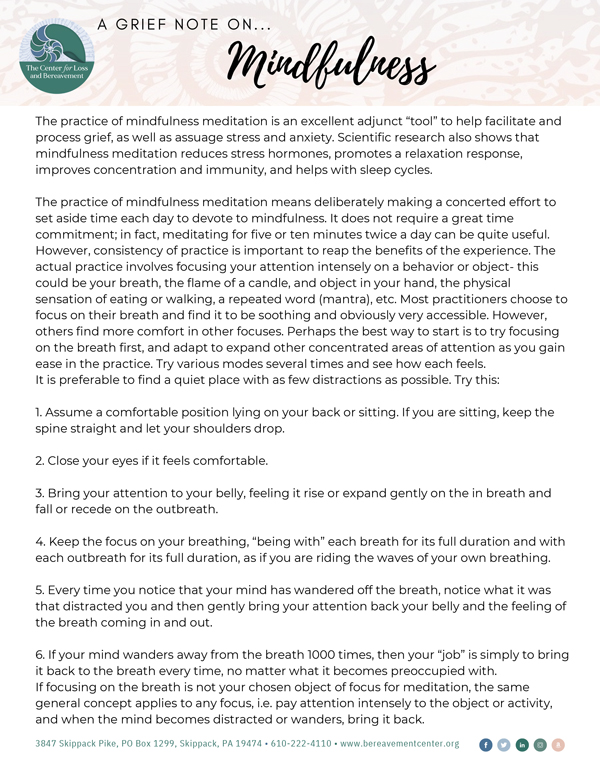CLB Grief Notes
A Grief Note On…
Mindfulness
The practice of mindfulness meditation is an excellent adjunct “tool” to help facilitate and process grief, as well as assuage stress and anxiety. Scientific research also shows that mindfulness meditation reduces stress hormones, promotes a relaxation response, improves concentration and immunity, and helps with sleep cycles.
The practice of mindfulness meditation means deliberately making a concerted effort to set aside time each day to devote to mindfulness. It does not require a great time commitment; in fact, meditating for five or ten minutes twice a day can be quite useful. However, consistency of practice is important to reap the benefits of the experience. The actual practice involves focusing your attention intensely on a behavior or object- this could be your breath, the flame of a candle, and object in your hand, the physical sensation of eating or walking, a repeated word (mantra), etc. Most practitioners choose to focus on their breath and find it to be soothing and obviously very accessible. However, others find more comfort in other focuses. Perhaps the best way to start is to try focusing on the breath first, and adapt to expand other concentrated areas of attention as you gain ease in the practice. Try various modes several times and see how each feels. It is preferable to find a quiet place with as few distractions as possible. Try this:
- Assume a comfortable position lying on your back or sitting. If you are sitting, keep the spine straight and let your shoulders drop.
- Close your eyes if it feels comfortable.
- Bring your attention to your belly, feeling it rise or expand gently on the in breath and fall or recede on the outbreath.
- Keep the focus on your breathing, “being with” each breath for its full duration and with each outbreath for its full duration, as if you are riding the waves of your own breathing.
- Every time you notice that your mind has wandered off the breath, notice what it was that distracted you and then gently bring your attention back your belly and the feeling of the breath coming in and out.
- If your mind wanders away from the breath 1000 times, then your “job” is simply to bring it back to the breath every time, no matter what it becomes preoccupied with.
If focusing on the breath is not your chosen object of focus for meditation, the same general concept applies to any focus, i.e. pay attention intensely to the object or activity, and when the mind becomes distracted or wanders, bring it back.
It is inevitable for the mind to become distracted by noises in the environment, feelings in the body, as well as the all too frequent clutter of thoughts and feelings. It is crucial to do the meditation with an attitude of love and compassion toward oneself. This means when your mind wanders off of the breath (or other chosen focus), simply take notice of the nature of the distraction, gently and non-judgmentally escort the thought out of your mind, and return to the breath. During times of extreme stress, you may find it to be extremely difficult maintaining focus on the breath which can generate feelings of frustration. The point is to realize that it is not a contest, you are not being “graded”, and simply the act of focusing and refocusing is the essence of the therapeutic benefit.
An important point to realize is that the activity of escorting intrusive thoughts, feelings, and sensations out of the mind is NOT with the goal of avoiding or ignoring them. They will likely reassert themselves repetitively throughout the day anyway and can be addressed later. The essence of meditation is that the act of focusing and refocusing puts “space” between your thoughts and having to react to them. Each time you consciously choose to redirect your attention back to your breath, you gain a sense of control and spaciousness, knowing that you can tend to any of the distracting thoughts later (or not). With practice, meditators gradually become more aware of their thoughts and feelings with a greater degree of calmness and perspective. This increased sense of perspective results in the griever being better able to disentangle from repetitive, counterproductive, anxiety-laden thoughts that can be so exhausting and debilitating.
Regular mindfulness practitioners find that over time they “look forward” to taking time each day to meditate, which becomes for them a refuge of sanity and stability that can be used to restore a sense of balance and awareness. They do not view meditation as drudgery or “a chore”, but as a gift to themselves.
Join Our
Mailing List
Donate
Today
Request
Information

Affiliations
• NACG
• CBEM Changemaker
• ADEC
• Charity Navigator
Quick Links
About Us
Individual & Family Grief Counseling
Volunteer
News
Grief Support Resources
Contact
Ph: 610-222-4110
Fax: 610-222-4116
3847 Skippack Pike
P.O. Box 1299
Skippack, PA 19474
Support The Center For
Loss and Bereavement
